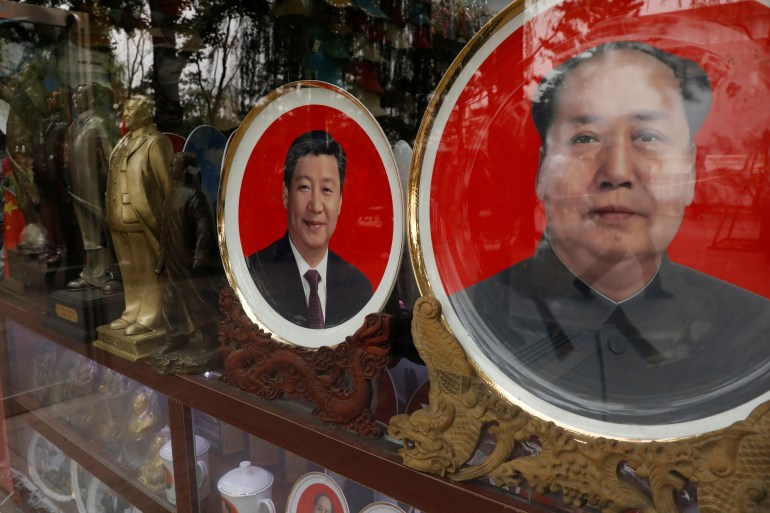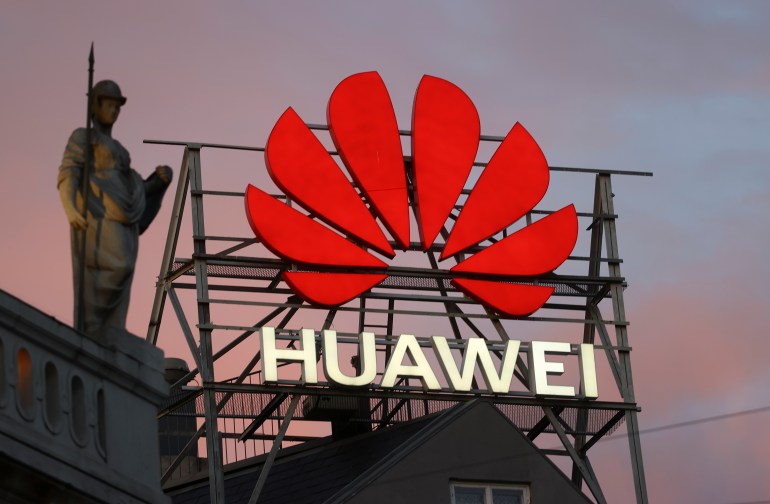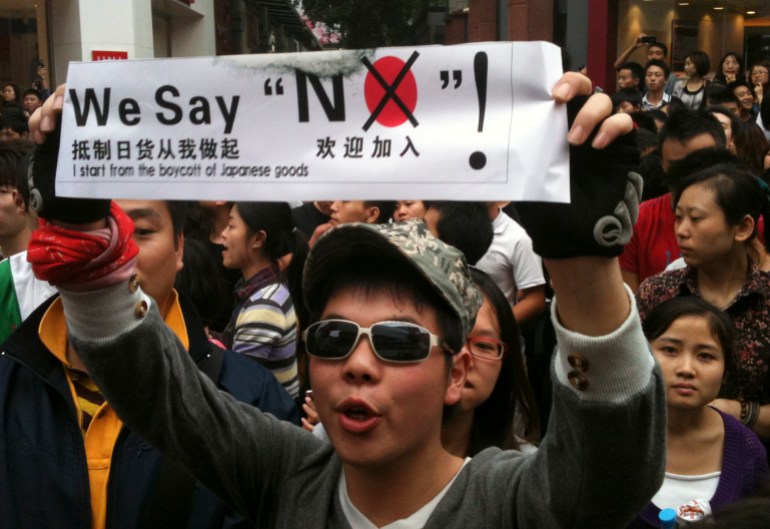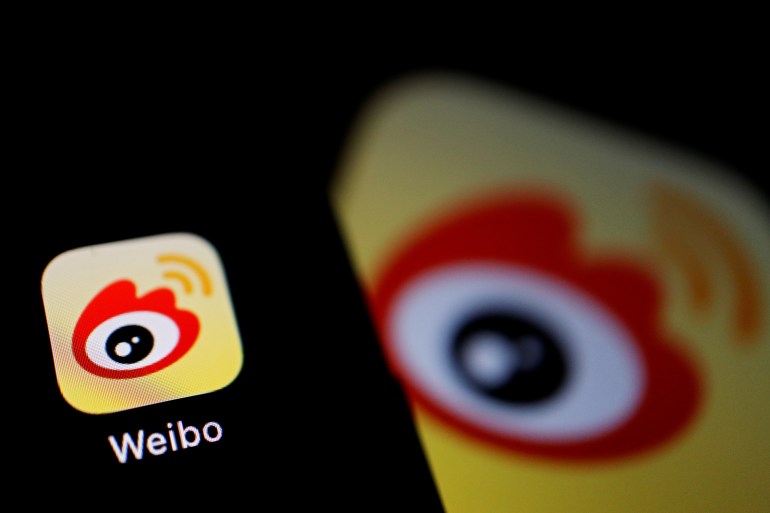[
In January, a Chinese language ultranationalist vlogger – video blogger – observed pink round stickers on the glass doorways of a shopping center in Nanjing that learn: “Completely satisfied 2024.”
The vlogger claimed that what gave the impression to be harmless New Yr decorations had, the truth is, nationalistic Japanese motifs because the pink circles resembled the rising pink solar within the nationwide flag of Japan.
“That is Nanjing, not Tokyo! Why are you conserving the junk like this?” He lashed out at a supervisor on the mall.
Native police later turned concerned and ordered mall employees to take away the decorations and gave an official warning to the mall's administration.
“That is probably the most ridiculous factor I've ever heard,” Alice Lu, a 33-year-old noodles store proprietor from Shanghai, informed Al Jazeera.
“If the pink circle isn’t allowed, there isn’t a finish to the issues that ought to be eliminated,” Lu mentioned.

Following the usual set by native police in Nanjing, customers on Chinese language social media shortly highlighted the absurdity of all of the pink round objects that might must be banned, together with the brand of China's telecommunications big Huawei, China's first Incorporates posters of communist leaders. , Mao Zedong, with the rising solar within the background, and even site visitors lights.
The reason for this furore was China's state-owned CCTV, which punished the vlogger in an article on his Weibo account, calling his actions “dangerous to people, firms, and society as a complete.”
Shaoyu Yuan, a Chinese language research scholar at Rutgers College in the USA, mentioned CCTV's feedback display an effort by the Chinese language authorities to keep up state management over the narrative round nationalism.
“They wish to be certain that nationalism serves as a unifying power reasonably than being abused,” Yuan informed Al Jazeera.

operation of patriotism
For years, the rule of Chinese language President Xi Jinping has inspired a way of fervent patriotism among the many public.
Xi mentioned in June that “love for one's nation, a way of devotion, and a sense of attachment to at least one's motherland are the obligation and accountability of each Chinese language”, and “the essence of patriotism is to like the nation, the Get together, and socialism all”. On the identical time”.
The significance of state-defined patriotism was highlighted in early January when a brand new “patriotic training regulation” got here into impact in China with the acknowledged goal of instilling “love of the nation and the ruling Chinese language Communist Get together (CCP).”
Throughout Xi's presidency, patriotic fervor was projected outward from China by its “wolf warrior” diplomats, together with former Overseas Ministry spokesman Zhao Lijian, who infamously unfold the concept in Wuhan The US army was answerable for the COVID-19 coronavirus outbreak.
Zhao additionally posted a fabricated picture depicting an Australian soldier holding a bloodied knife to the throat of an Afghan youngster in 2020, at a time when relations between Australia and China had been in decline.
Whereas the CCP promotes its personal model of patriotism, it additionally typically controls nationalist output.
Continually bashing America on-line is a typical pastime amongst lively Chinese language nationalists. However forward of a extremely anticipated summit between President Xi and US President Joe Biden in November, China's media and nationalist commentators instantly stepped up their anti-US rhetoric.
In accordance with Yuan, Beijing adjusts the quantity of nationalist rhetoric to serve its pursuits, participating in balancing patriotic sentiment when crucial.
Yuan mentioned, “Whereas nationalism is inspired as a method of fostering a robust nationwide identification and loyalty, its excesses can result in extremism and undermine worldwide diplomacy, social concord, and public order. “
nationalism turns violent
Lu from Shanghai mentioned the Nanjing incident was an instance of how fostering intense patriotic emotions in China has created a poisonous atmosphere – particularly with regards to Japan-related matters.
“It's truly slightly scary how anti-Japanese sentiments could cause some individuals in China to react,” he mentioned.
Chinese language fashionable nationalism directed at Japan is deeply influenced by historic conflicts, Yuan mentioned, significantly the occasions of the Second Sino-Japanese Struggle throughout World Struggle II.
“They’ve left an indelible mark on the Chinese language collective reminiscence, growing emotions of resentment and wariness towards Japan,” he mentioned.
Anti-Japanese sentiment was on show in 2022 when police within the metropolis of Suzhou, positioned a brief distance from Shanghai, approached a widely known cosplayer as a result of she was taking images of herself on the road sporting a Japanese kimono. Earlier than being taken away, a police officer was recorded shouting on the girl: “When you’ve got come right here sporting Hanfu (conventional Chinese language garments), I cannot say it, however you might be sporting a kimono as a Chinese language. You’re Chinese language!”
A number of days after the arrest, CCTV launched a social media matter to advertise the sporting of Hanfu-style clothes.

Nonetheless, the Suzhou incident pales compared to that of August 2012, when a dispute over management of the Senkaku/Diaoyu islands within the East China Sea, that are administered by Tokyo however claimed by Beijing, led to large-scale protests in city China. Anti-Japanese protests befell.
Whereas protests are sometimes swiftly damaged up by Chinese language authorities, anti-Japanese demonstrations in lots of cities noticed no interference and from there they turned more and more violent.
Within the central Chinese language metropolis of Xi'an, a Chinese language man touring in a Japanese automotive was pulled out of his car and severely overwhelmed, leaving him with life-changing accidents.
The federal government-controlled Folks's Each day later mentioned in an editorial that it didn’t condemn the violence, however as a substitute tried to clarify it as an indication of the Chinese language individuals's patriotism.
By the point police intervened and restored order in late September, Japanese outlets, firms and eating places had been vandalized and Sino-Japan relations had deteriorated.
Simon Wan, a 36-year-old gross sales consultant, remembers the time demonstrations in Beijing become riots.
“From our house window, we noticed individuals break into my father's Toyota (a Japanese automotive model), which was parked on the road under,” he informed Al Jazeera.
“My household and I stayed indoors more often than not in these days to keep away from hassle. It was fairly scary.”
Wan believes the federal government doesn’t wish to see a repeat of the 2012 anti-Japan riots.
“So, I believe they reacted to the nationalist vlogger in Nanjing as a result of they wished to keep away from any sort of escalation,” he mentioned.
In accordance with Yuan, when ultranationalist fervor causes property injury or turns into counterproductive to China's diplomatic objectives, it goes too far, at which level Chinese language authorities will attempt to cease it – as occurred in Nanjing. .
pay the worth of patriotism
Nonetheless, the vlogger in Nanjing was not punished only for being overly nationalistic. He has been criticized for utilizing patriotism to make earnings from his video weblog.
CCTV reprimanded the vlogger, saying, “Patriotism isn’t a enterprise.”
However, for a lot of nationalist bloggers and vloggers on Chinese language social media, patriotism can truly be a profitable enterprise.
In accordance with Yuan, there are numerous methods to monetize patriotism for individuals like public determine and commentator Hu Zijin, who has leveraged his nationalist stance to realize vital followers on social media.
He added, “This industrial facet of patriotism contains not solely direct earnings from social media platforms by way of commercials and sponsored content material, but additionally endorsements and partnerships with manufacturers that wish to affiliate themselves with patriotic sentiments “
Chinese language social media accounts with multiple million followers can earn their homeowners just a few hundred thousand {dollars} a 12 months, whereas nationalist commentators like Hu Zijin have tens of millions of followers. However as vloggers in Nanjing discovered, the eye attracted by nationalist posturing doesn’t assure fame and fortune, and might as a substitute result in infamy and misfortune.

In 2022, blogger Sima Nan had her social media accounts blocked on Chinese language platforms after getting concerned in a disagreement with Chinese language tech agency Lenovo, throughout which it was revealed that she was a landlord within the US state of California. Regardless of his open anti-Americanism.
One other nationalist, Kong Qingdong, was banned from Weibo in 2022 for unknown causes. Kong was additionally briefly banned in 2012 after he referred to Hong Kong individuals as “canine” and different abuses, sparking a public outcry.
“Pursuing the trail of nationalistic content material creation in China might be as harmful as it’s worthwhile,” Yuan mentioned.
“Whereas the Chinese language authorities usually helps and promotes nationalistic sentiment in step with its insurance policies and picture, there are pink traces that can’t be crossed, and content material creators who enterprise too far will probably be topic to the federal government's stance “Anybody who misinterprets the Structure or criticizes its insurance policies – even beneath the guise of nationalism – might face sharp penalties,” he mentioned.
Including to the hazard, China's pink traces are fluid and might change shortly relying on the scenario.
The sudden shift in nationalist rhetoric main as much as the Biden-Xi summit in November is an instance of such a fast shift.
Yuan defined, “A nationalist stance that aligns with the federal government's present diplomatic posture could also be inspired at one time, however might turn into problematic if diplomatic priorities change and the stance is not deemed acceptable.” May.”
Such fluidity is a component of the CCP's balancing act with respect to nationalism.
“Its (CCP) aim is to foster a robust sense of nationwide identification and delight amongst its residents whereas avoiding the pitfalls of chauvinism, which might result in xenophobia, regional tensions or inner discontent,” Yuan mentioned.
“Moreover, the Chinese language authorities has all the time tried to stop any single voice or group from changing into so influential in nationalist discourse that it might problem the authority of the Communist Get together or type factions inside society.”
Recalling his expertise through the anti-Japan riots in 2012, Wan, a gross sales consultant from Beijing, mentioned he apprehensive that the federal government's promotion of patriotism and tolerance over nationalism would endanger Chinese language society in the long term.
“I believe President Xi informed US President Biden just a few years in the past that those that play with fireplace will get burned,” he mentioned.
“I believe the identical is true for anybody in China who performs an excessive amount of with the hearth of nationalism.”

